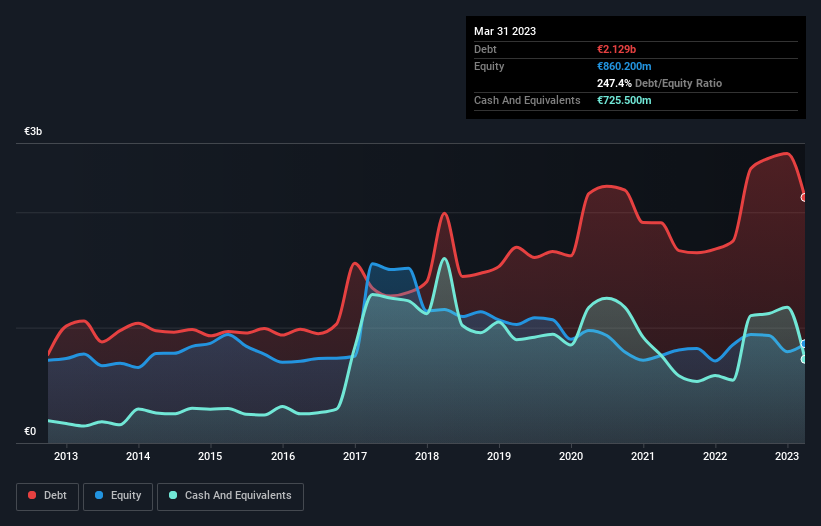
David Iben put it well when he said, 'Volatility is not a risk we care about. What we care about is avoiding the permanent loss of capital.' So it might be obvious that you need to consider debt, when you think about how risky any given stock is, because too much debt can sink a company. We can see that Prosegur Compañía de Seguridad, S.A. (BME:PSG) does use debt in its business. But the real question is whether this debt is making the company risky.
What Risk Does Debt Bring?
Debt assists a business until the business has trouble paying it off, either with new capital or with free cash flow. In the worst case scenario, a company can go bankrupt if it cannot pay its creditors. However, a more common (but still painful) scenario is that it has to raise new equity capital at a low price, thus permanently diluting shareholders. Having said that, the most common situation is where a company manages its debt reasonably well - and to its own advantage. The first step when considering a company's debt levels is to consider its cash and debt together.
Check out our latest analysis for Prosegur Compañía de Seguridad
What Is Prosegur Compañía de Seguridad's Debt?
As you can see below, at the end of March 2023, Prosegur Compañía de Seguridad had €2.13b of debt, up from €1.75b a year ago. Click the image for more detail. However, because it has a cash reserve of €725.5m, its net debt is less, at about €1.40b.

A Look At Prosegur Compañía de Seguridad's Liabilities
According to the last reported balance sheet, Prosegur Compañía de Seguridad had liabilities of €1.49b due within 12 months, and liabilities of €2.11b due beyond 12 months. Offsetting these obligations, it had cash of €725.5m as well as receivables valued at €954.5m due within 12 months. So its liabilities outweigh the sum of its cash and (near-term) receivables by €1.92b.
The deficiency here weighs heavily on the €879.9m company itself, as if a child were struggling under the weight of an enormous back-pack full of books, his sports gear, and a trumpet. So we'd watch its balance sheet closely, without a doubt. At the end of the day, Prosegur Compañía de Seguridad would probably need a major re-capitalization if its creditors were to demand repayment.
We measure a company's debt load relative to its earnings power by looking at its net debt divided by its earnings before interest, tax, depreciation, and amortization (EBITDA) and by calculating how easily its earnings before interest and tax (EBIT) cover its interest expense (interest cover). This way, we consider both the absolute quantum of the debt, as well as the interest rates paid on it.
Prosegur Compañía de Seguridad has a debt to EBITDA ratio of 3.3, which signals significant debt, but is still pretty reasonable for most types of business. However, its interest coverage of 18.4 is very high, suggesting that the interest expense on the debt is currently quite low. Importantly, Prosegur Compañía de Seguridad grew its EBIT by 53% over the last twelve months, and that growth will make it easier to handle its debt. The balance sheet is clearly the area to focus on when you are analysing debt. But ultimately the future profitability of the business will decide if Prosegur Compañía de Seguridad can strengthen its balance sheet over time. So if you want to see what the professionals think, you might find this free report on analyst profit forecasts to be interesting.
But our final consideration is also important, because a company cannot pay debt with paper profits; it needs cold hard cash. So the logical step is to look at the proportion of that EBIT that is matched by actual free cash flow. During the last three years, Prosegur Compañía de Seguridad generated free cash flow amounting to a very robust 81% of its EBIT, more than we'd expect. That positions it well to pay down debt if desirable to do so.
Our View
Based on what we've seen Prosegur Compañía de Seguridad is not finding it easy, given its level of total liabilities, but the other factors we considered give us cause to be optimistic. There's no doubt that its ability to to cover its interest expense with its EBIT is pretty flash. Looking at all this data makes us feel a little cautious about Prosegur Compañía de Seguridad's debt levels. While debt does have its upside in higher potential returns, we think shareholders should definitely consider how debt levels might make the stock more risky. When analysing debt levels, the balance sheet is the obvious place to start. However, not all investment risk resides within the balance sheet - far from it. These risks can be hard to spot. Every company has them, and we've spotted 2 warning signs for Prosegur Compañía de Seguridad (of which 1 makes us a bit uncomfortable!) you should know about.
Of course, if you're the type of investor who prefers buying stocks without the burden of debt, then don't hesitate to discover our exclusive list of net cash growth stocks, today.
New: Manage All Your Stock Portfolios in One Place
We've created the ultimate portfolio companion for stock investors, and it's free.
• Connect an unlimited number of Portfolios and see your total in one currency
• Be alerted to new Warning Signs or Risks via email or mobile
• Track the Fair Value of your stocks
Have feedback on this article? Concerned about the content? Get in touch with us directly. Alternatively, email editorial-team (at) simplywallst.com.
This article by Simply Wall St is general in nature. We provide commentary based on historical data and analyst forecasts only using an unbiased methodology and our articles are not intended to be financial advice. It does not constitute a recommendation to buy or sell any stock, and does not take account of your objectives, or your financial situation. We aim to bring you long-term focused analysis driven by fundamental data. Note that our analysis may not factor in the latest price-sensitive company announcements or qualitative material. Simply Wall St has no position in any stocks mentioned.
About BME:PSG
Proven track record average dividend payer.
Similar Companies
Market Insights
Community Narratives



